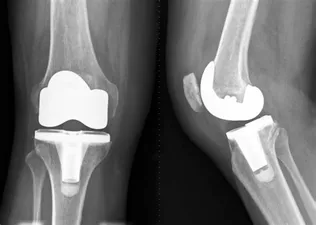A 33-year-old patient from Uzbekistan with an advanced case of rheumatoid arthritis came to India for his knee replacement surgery. He had undergone total hip replacement surgery a few months ago; however, there was no improvement in his condition. When he came to the hospital, he was unable to walk because the knee pain was unbearable. Upon examination, it was detected that the patient’s knees were severely deformed, which led to acute pain. He could walk with the help of crutches and was also on a high dose of medicine to manage his pain. After further investigation, it was revealed that the patient was suffering from osteoporosis and anemia.
To provide long-term relief, the patient was recommended for robot-assisted minimally invasive knee replacement surgery. Robotic surgery ensured a quick recovery from the pain and discomfort, which were increasing with time. Post-surgery, the patient’s previous deformities were fully corrected, which enabled him to walk without support within 48 hours of surgery. By day three, he was climbing the stairs and doing routine tasks normally.
In recent years, there has been a rise in the trend of joint replacement surgeries, especially in young adults (people below the age of 50). While joint replacement surgery has traditionally been associated with the elderly, an increase in joint-related injuries, sedentary lifestyles, and conditions such as obesity, as well as autoimmune disorders, have resulted in orthopaedic problems in the younger population. More than 2.5 lakh people undergo total knee replacement surgery in India every year. This number has increased over three times in the past five years.
Knee replacement surgery is an effective and reliable option for all age groups. Most adults prefer to undergo knee replacement surgery because they are working and do not want the pain to interfere with their work. The surgery ensures mobility, flexibility, and overall strength in young people with minimal post-operative time. It allows them to resume day-to-day activities without having to be concerned about pain management.
The state-of-the art of robot system is capable of 3D pre-planning, accurate assessment of deformities, and precise surgical results, providing exceptional patient outcomes. Robotic knee replacement surgery involves the removal of the damaged tissue of the knee joint and replacing it with an artificial joint. The advancement in technology, such as a fully active robotic system coupled with minimally invasive surgical (MIS) techniques, is a breakthrough for performing the procedure more safely and efficiently with minimal blood loss and a lower revision rate.
Benefits of robotic knee replacement surgery
Robotics is the latest technology that has revolutionized high-precision surgical procedures worldwide. They not only help surgeons execute surgeries with precision, but also provide real-time AI-based backup to deal with and manage any kind of problems that might crop up during the surgery.
The procedure is safe and it ensures
• Precise and accurate surgery without any scope of manual errors.
• Accessibility to delicate regions to treat core issue.
• Reduced complications such as infections and blood loss.
• Lower chances of restorative and revision surgeries in the future.
• Reduced hospital stays with quick recovery time.
The surgery is not only user-friendly and flexible but also offers precision and safety. For patients, this advanced technology provides exceptional outcomes, minimal infection risk, quicker recovery time, and less pain. Patients can walk within hours after surgery. It is a life-long solution for patients with joint problems and a specialized MIS surgical technique which ensures a good quality of life for the patient in a long run.
Dr Amit Javed is Director-Dept. of Advanced Surgical Sciences & Onco- Surgeries, CK Birla Hospital, Delhi.























